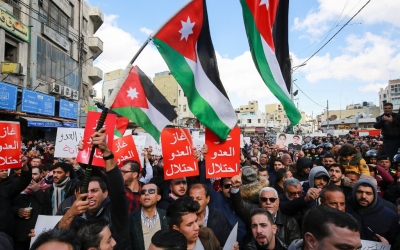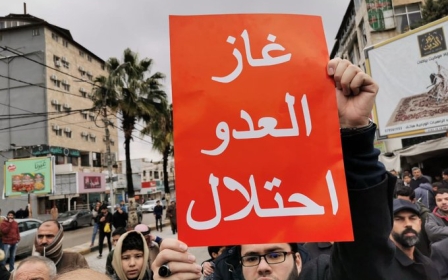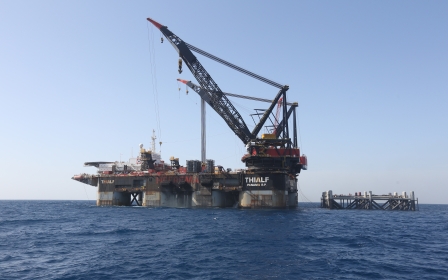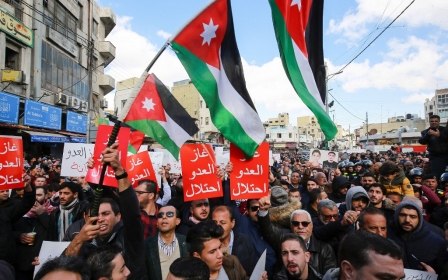Israeli promises to annex Jordan Valley threaten peace deal with Amman
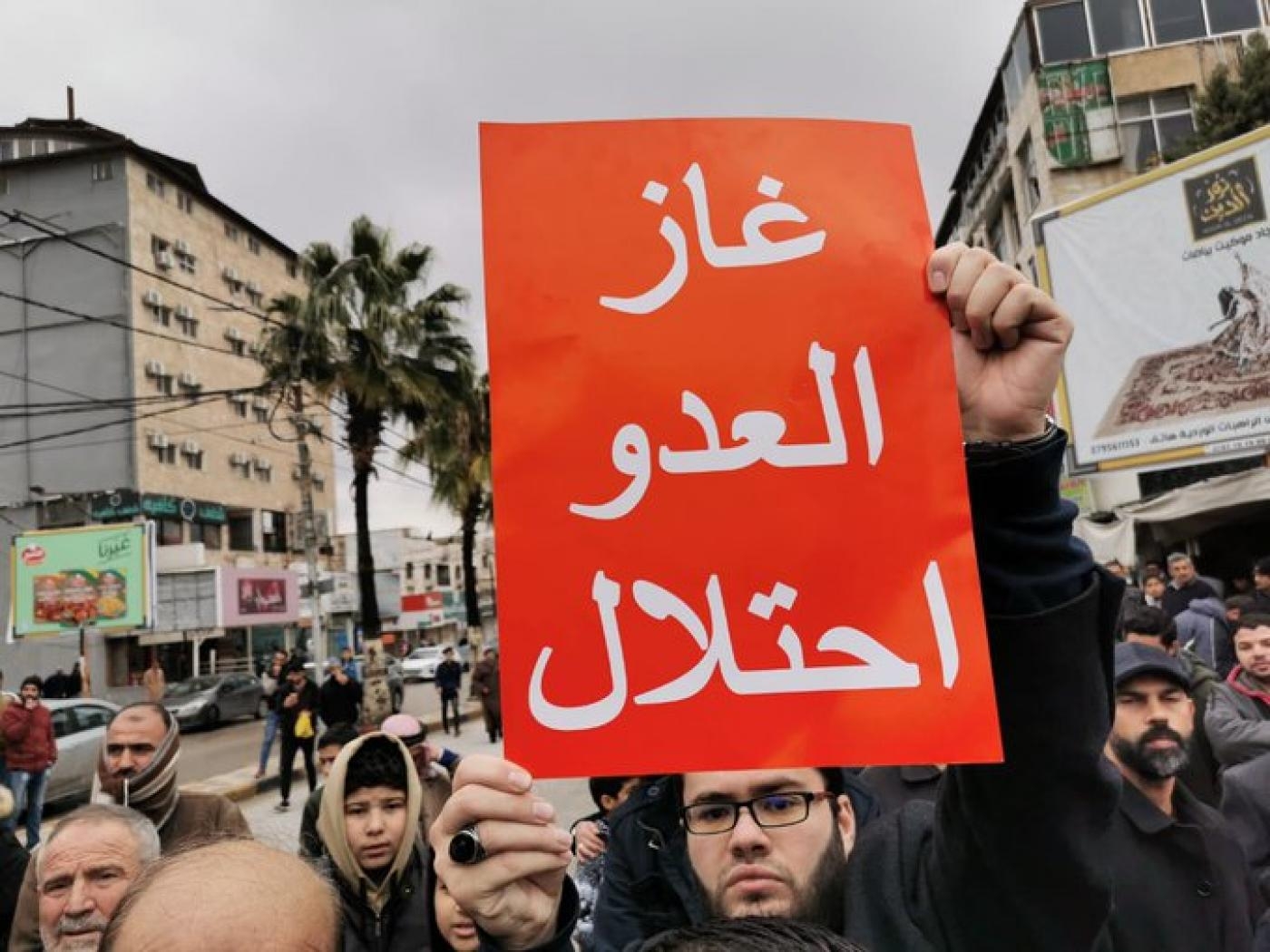
Hundreds of Jordanians have held demonstrations outside the National Electric Power Company in Amman this month to protest against the pumping of Israeli gas into the country which began at the start of January.
The protests against the government and Israel have been inflamed by statements from Israeli leaders that they would annex the occupied Palestinian Jordan Valley following March's election in Israel.
Last week, Benny Gantz, the leader of Israel's opposition Blue and White party, echoed a promise by Israeli Prime Minister Benjamin Netanyahu that he would annex the area if he came to power.
The targeted area connects the eastern mountains of the occupied West Bank and the Sea of Galilee in the north, with the Dead Sea in the south.
The area totals around 2,400 square kilometres and represents 30 percent of the occupied West Bank.
Prominent national, youth and religious leaders took part in this month's demonstrations, where placards displaying anti-Israeli occupation slogans were raised.
Placards read: “Together against the gas deal with the occupation", "The gas deal is an occupation", "The gas of the enemy is occupation", and "Down with the attempts to wipe out the Palestinian cause.”
'Deal of the century'
Some of the protesters have called on the government not only to cancel the gas deal but also Jordan's peace treaty with Israel.
The treaty was signed in October 1994 by the prime ministers of Israel and Jordan with the backing of the late King Hussein of Jordan.
King Abdullah II, Hussein's son, told German Chancellor Angela Merkel in September that “the plans of Netanyahu to annex the valley will not create the appropriate political environment for a solution and will turn the chance of a peace solution into a catastrophe."
The situation, and Jordan's response to any annexation, has now taken on a new urgency with US President Donald Trump's "deal of the century" - already rejected by the Palestinians - expected to be revealed this week.
King Abdullah made a short statement on Sunday rejecting the proposed US deal saying that: "Our position is well-known: No, it is obvious to everyone."
Vote winner
As to whether Jordan is serious about suspending the peace treaty if Israel does in fact annex the Jordan Valley, former government spokesman Mohammad Momani told MEE: “I expect that some sectors of cooperation that are listed in the peace treaty will be suspended. The expected Trump plan will affect this cooperation.
“[The] annexation of the valley means taking away occupied territories that belongs to Palestinians according to international law".
"This is the area earmarked for their state. The annexation therefore will put obstacles in the way of the creation of an independent Palestinian state, which is of the highest interest to Jordan, as this will affect Jordan’s interests in the negotiations for a permanent resolution,” he said.
Jordan is holding tight to the principle of a two-state solution, which requires the creation of an independent Palestinian state based on the borders of 1967, with East Jerusalem as its capital.
"The Jordan Valley area targeted will break up the natural connections between Jordan and the areas of the Palestinian government," said Momani.
"This will hurt Jordan and will not only deny Palestinians their statehood, but will also deny Palestinian refugees to be able to return."
Ayman Hunaiti, who runs the Hebrew department at Jordan's official news agency Petra, believes that the “talk about annexing the Jordan Valley is a winning ticket in Israel to win votes in the upcoming election”.
Speaking to MEE, Hunaiti said: “The Israeli media suggests different scenarios for how this will affect relations between Jordan and Israel.
"But all these possibilities will not lead to the cancellation of the peace treaty... but it might lead to the suspension of the treaty.”
'This plan will embolden Israel'
In a statement on Thursday, the Jordanian foreign ministry said the planned Israeli annexation would “kill” the chances of peace.
Ayman Safadi, Jordan’s foreign minister, said: “This plan will embolden Israel to continue its illegal actions which aim at creating new realities on the ground which will kill every possible chance for a permanent peace that the people of the region will accept”.
However, political analyst Labib Kamhawi told MEE that Jordan is not serious about suspending the peace treaty with Israel and will limit itself to words of denunciation if the annexation takes place.
“Israel has taken serious actions, such as the moving of the US embassy to Jerusalem in 2017, and the large settlement activities, and Jordan has refrained from abrogating the 1994 peace treaty," he said.
Annexing the Jordan Valley should be a red line for Jordan, Kamhawi said, but the kingdom "stands helpless in this regard".
Pointing to the gas deal between the two nations, Kamhawi said that "Israel is not worried about the repercussions of its actions on the peace deal with Jordan, because they feel that all Arabs are in Israel’s pocket and Jordan is in Israel’s smallest pocket.”
Kamhawi warned King Abdullah of consequences arising from such an annexation, saying that it would “push Palestinian and Israeli negotiations even further from each other”.
This article is available in French on Middle East Eye French edition.
Middle East Eye propose une couverture et une analyse indépendantes et incomparables du Moyen-Orient, de l’Afrique du Nord et d’autres régions du monde. Pour en savoir plus sur la reprise de ce contenu et les frais qui s’appliquent, veuillez remplir ce formulaire [en anglais]. Pour en savoir plus sur MEE, cliquez ici [en anglais].


